QuestionMy cat was in/outdoor cat & was attacked & then we found out he has FIV. Rather than put him down I chose to keep him in. I built an enclosure but he isn't interested. He sit's and yowl's. Since being kept in he has started peeing on every thing, you name it. He's been to the vet & is fine except FIV. I have 2other cats & an wondering if he is marking where they like to lay or what? & how to stop it? I tried containing him, playing, etc.. not working
AnswerKelly,
I would strongly suspect that your cat's inappropriate elimination is the result of anxiety created by an abrupt change of routine. It sounds to me like your cat is extremely anxious as a result of the necessary break in his routine. Cats are very territorial and they aren't usually fond of change. As far as this kitty is concerned he has been allowed to go outdoors every day up until this point and he doesn't see why this has changed. You can certainly try a homeopathic remedy called Bach's Rescue Remedy which is a blend of flower essences designed to calm and reassure. I have personally used Rescue Remedy for a number of years to treat a variety of issues including anxiety, excessive fear resulting from a cat being in an unfamiliar situation or even emotional/psychological trauma. I would suggest that you try a dosage of about 8-9 drops in a bowl of fresh water each morning. I would advise against trying to give your cat his dose of Rescue Remedy directly in his mouth because the homeopathic ingredients are suspended in a solution of grape alcohol and most cats aren't terribly fond of strong odors. Rescue Remedy is a very safe over the counter option that's used by some pet parents and veterinarians worldwide to help an animal get through a variety of stressful situations. You can usually find Rescue Remedy in health food/natural health stores. If your cat shows improvement in his less than desirable house soiling behavior, but it doesn't completely stop then I would suggest that you consider speaking to a holistic vet about other treatment options. A holistic vet is trained in conventional medicine as well as alternative therapies such as homeopathy, massage or acupuncture. It's a good idea to try non-pharmaceutical methods to treat anxiety in cats before using powerful psychotropic drugs. Veterinarians can prescribe anti-anxiety medications to treat cats with behavioral issues such as inappropriate elimination. Many of the medications commonly prescribed by vets for cats who are anxious are actually tiny doses of human anti-anxiety or anti-depressant drugs. The use of these drugs isn't without risk or side effects. I suggest that you do your research and be sure to ask your vet any questions that you may have about these powerful psychotropic drugs.
If your kitty hasn't been neutered yet that you should certainly do so as this may be partially causing the urine marking around the house. Having your cat surgically sterilized will decrease his need to use urine to mark his territory. Urine marking is an instinctive cat behavior that is used as a means of communication with other cats. Urine marking can often reappear in domestic house cats if they are feeling stressed by changes in their territory like adding or subtracting a family member, renovations, a family move, changes in their caregiver's schedule, or even feeling threatened by another cat outside of the house.
For some cats looking outside from a window inside of the house can be a very stressful experience, specifically if they see cats from around the neighborhood in their yard. Some cats will also become anxious or stressed as a result of seeing wild animals in their territory. This issue isn't uncommon and it can be fairly easily resolved by applying a removable privacy film. There are countless types and designs of privacy film available in hardware stores, they vary in design and price so it is advisable to shop around. The privacy film doesn't have to mean that your windows are completely frosted over, many of the newer designs provide privacy and still allow sunlight into the house. For cats who find themselves anxious about intruders to their territory that they are able to see through a window applying a privacy film will help them to settle down and not be upset enough to urinate in the area to identify their territory. This issue is fairly common among cats that haven't been spayed or neutered.
Sometimes a cat that is urinating outside of the litter box can be doing so as a result of medical conditions such as a urinary tract infection or crystals in the bladder or urinary tract, however this isn't likely the cause in your cat's case because you have had him assessed by a vet so I would assume that a urine sample has been analyzed. Scent is a very important part of communicating with other animals, in fact scent is the first sense that a kitten is able to use from birth - his eyes are protected from bright light and damage that could follow exposure to a strong light source because they are closed at birth, newborn kittens are able to hear, but sounds are muffled by the ear flaps being somewhat folded over. Touch and taste and smell are the only senses that nature doesn't minimize by only allowing a certain amount of stimulation.
A newborn kitten's sense of smell is important from the time that they take their first breath, it allows them to find their way to their mother's teats so that they can get started on the very important first meal of their lives. That having been said kittens also learn fairly early on that scent is a very important part of communicating with other cats, after all cats possess scent glands in their faces, paws and rear end that identify them as unique individuals. Cats commonly mark their territory with their own scent by using urine or feces as well as "sharpening" (cats actually aren't sharpening their claws, they are using the scent glands in their paws to mark important places in their territory as well as helping to remove claw casings that are in the process of shedding, lastly cats are enjoying the opportunity to stretch) on trees, scratch posts and furniture as well as rubbing their cheeks against items and people that are important to them. For a cat urine, feces and pheromones are powerful markers that provide information about the cat that left them such as age, sex, whether or not they are ready to mate and information about the health of the other cat. Regular household cleaners don't completely remove the odor so the information that a cat leaves behind by urinating, defecating or scent marking is often still present after cleaning.
It's extremely important to use the right product to clean anything that this cat urinates on so I would suggest that you use an enzymatic cleaner. Unfortunately not all household cleaners will completely remove odors, some will actually mask odors with perfumes so that human beings can no longer smell them, however a cat's olfactory senses are many times more sensitive than our sense of smell. Any household cleaner with ammonia in it will simply spread the smell around or add to it for sensitive feline noses. Enzymatic cleaners are products that use beneficial bacteria (enzymes) to permanently remove the components of biological substances (urine, feces, vomit, etc) that cause stains and odors. I have found a great product called Petzyme which has so far been extremely effective at cleaning up feces and vomit and as of yet Petzyme has proven to be safe on my carpeting and upholstery and the label provides instructions for adding this cleaner to your washing machine in the event that your cat has urinated on clothing or bedding. It is still a good idea to test Petzyme on an inconspicuous area of the material that you intend to use it on. Petzyme is well priced and effective, I originally found this product at Petsmart, however I have since seen it at a couple of other pet supply stores. If you are unable to find Petzyme in your local area you could consider going to a janitorial supply store and asking for an enzymatic cleaner as they are frequently used in institutions and property management because of their effectiveness.
I am fairly certain that your cat's behavior will resolve once his distress is addressed and treated either by using Rescue Remedy, seeking the help of a holistic vet or using anti-anxiety drugs to settle this kitty down, however I have also included information about other common reasons for inappropriate elimination. You can also try a couple of simple strategies like placing disposable litter boxes filled with clumping kitty litter that is free of dyes and perfumes in areas where your cat has urinated, this can sometimes be effective and the litter boxes can eventually be discarded gradually over time. If your local pet supply store doesn't sell disposable litter boxes you can try using disposable baking pans often sold in discount stores. If the idea of having several litter boxes in your home isn't plausible it is still important to make sure that there are enough litter boxes for the number of cats in the home. I usually recommend that a pet parent have one litter box per cat plus one, in cases where one or more cats are going to the toilet outside of the litter box my recommendation is one litter box per cat plus one per level of your home. If you use air fresheners, scented kitty litter or strong smelling cleaners to clean the litter boxes or the area around them your cat may be sensitive to the perfumes and dyes routinely added to these products. Litter boxes should be cleaned at least once daily to keep odor to a minimum. If you have children or a very busy household with a fair amount of noise and activity this could also be upsetting the cat. It's a very good idea to place the litter boxes in quieter areas of the house where the cats can use the toilet in private, after all nobody wants to be watched while they go to the washroom.
Another common behavioral cause of inappropriate elimination is placing the food and water dishes too close to the litter box. Cats are extremely fastidious and they don't like to eat where they use the toilet so it's a good idea to make sure that food and water dishes are located as far as possible from the litter boxes, I usually recommend placing the food and water in a corner of the kitchen. It's very important to realize that if your cat requires treatment for the stress that is causing him to urinate outside of the litter box it will take some time to be completely effective. It is possible to stop the cat from urinating outside of the litter box, but it will take patience, consistent treatment, understanding that he isn't trying to make you angry. Your vet can provide a fair amount of insight into the potential causes for this behavior and there are effective treatment options.

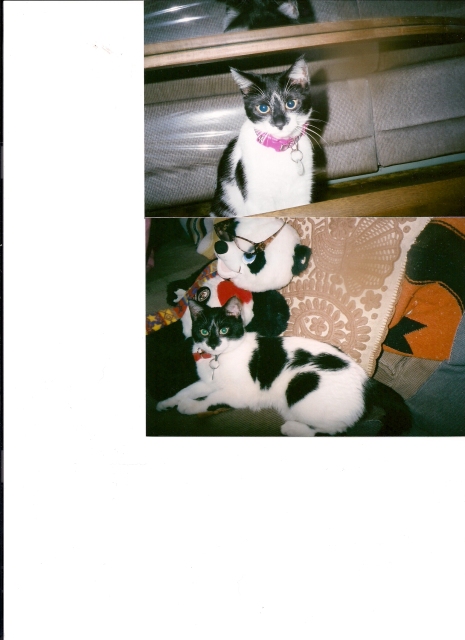 Recently Adopted Cat
Question
CREAM PUFF
Hello !
Hoping all is well.
Recently Adopted Cat
Question
CREAM PUFF
Hello !
Hoping all is well.
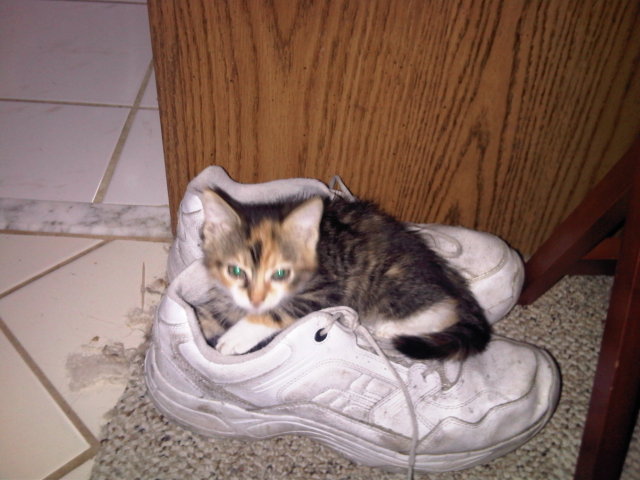 Kitten not eating
Question
Tiny
I have a 10 week old female kitten
Kitten not eating
Question
Tiny
I have a 10 week old female kitten
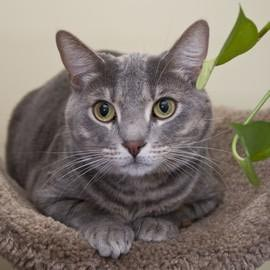 identify breed of cat
Question
Male cat 4 years ol
I recently adopted
identify breed of cat
Question
Male cat 4 years ol
I recently adopted
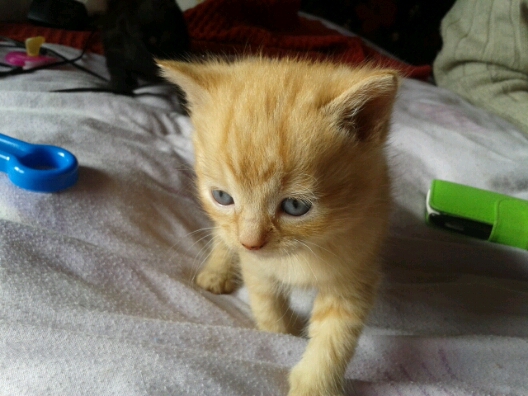 Two Kittens from different litters?
Question
Ginger Female
We wanted to get 2 kitten
Two Kittens from different litters?
Question
Ginger Female
We wanted to get 2 kitten
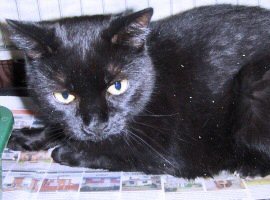 Worried that my cat has a UTI??
Question
Oscar
Hello,
My name is Danielle and I have t
Worried that my cat has a UTI??
Question
Oscar
Hello,
My name is Danielle and I have t